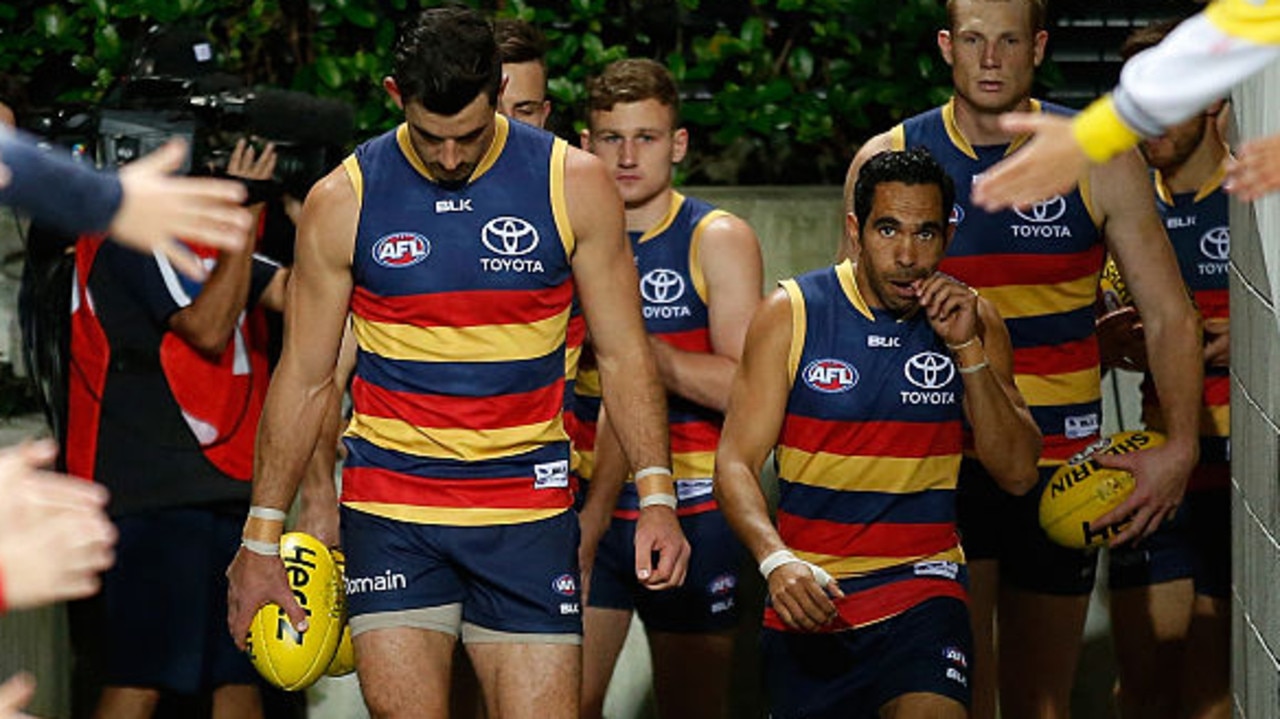The most clutch moments of AFL history are among the most memorable. From “Leo Barry, you star” to Barry Breen’s match-winning behind, those who step up in the biggest moments are remembered through history.
loading
Footy is often a game of millimeters despite being played in a glorified paddock.
loading
Whether it’s the luck of the bouncing oval ball or brilliantly executed skill, the ability to pull through when the going gets tough is critical for teams with September dreams.
Just look at Collingwood this year — their 15 wins this year have been underpinned by 10 wins in their 11 games decided by less than two goals.
About a quarter of all games are decided by two straight kicks or less.
Some believe that teams do well late because of good coaching, on-field leadership and training. Others believe it’s a little more down to luck.
How do games change when they heat up late, and who has stood up the most in close games recently?
Clock is ticking
Winning possession is at the core of football. This year, for every 100 times a team wins the ball in a game they score about 71 points. That rises to 91 points from 100 won center clearances, and drops to 30 points from kick-ins.
Where a team wins the ball matters a lot as well. Teams score three times as many points from the ball won in the front half of the ground compared with the defensive half.
Time also matters. Teams generally score more heavily early in quarters — with the exception of the first 10 minutes of a game.
In the fourth quarter of games where the margin is two goals, teams score at just 67 points for every 100 times they win possession. In time-on in the last quarter, that drops to just 65 points per 100.
The potential reasons for this are many: Teams with a lead late in close games tend to try to shut up shop, and try to take time off the clock.
Late game fatigue also plays a role, along with the mental weight of late game football and the weight of the footballing world sitting on the shoulders of 44, mostly young, players.
However, some players thrive when their team needs it the most.
circle of trust
Clutch time is hard to define. Just 333 minutes of football — shy of two minutes per game — have been played this year where the margin was less than 12 and the clock had passed the 20-minute mark in the last quarter.
Given the large number of players on the field, it’s often hard to stand up late, when it counts. No player has scored more than three goals in clutch time across either of the past two seasons. Taylor Walker’s six goals over the two seasons is the most of any player.
A bit more can be gained from looking at games where the margin was less than 12 points any time in the last quarter.
One name, at a club near the bottom of their rebuilding cycle, has shouldered the biggest burden in late games in the past two years.
Cameron Zurhaar is an imposing beast of a player — not quite the height of a key forward, but with speed and power to burn. His ability to compete both in the air and on the deck makes him more dangerous as the going gets tough.
loading
North Melbourne may not be in contention right now, but if they continue to develop, Zurhaar has the potential to be a matchwinner in big games.
To score, you have to have the ball, and certain players rise to the occasion. More skilful users and experienced players tend to shine in late game situations as teams look to their most-dangerous players.
There appears to be a subtle shift in dynamics in most teams, such as from Jarryd Lyons to Lachie Neale, or Tom Mitchell to Jaeger O’Meara. In raw terms, Patrick Cripps steps up the most for his team late in games, signaling his importance to him for the Blues.
The player who wins more stoppages at the death, compared to the rest of the game, is a less-heralded name: Liam Baker.
The young Tiger isn’t an imposing player but he is quick and agile, finding momentary creases in the opposition’s defence.
loading
When games become stagnant late it is often those with the most speed and initiative who can break through them, such as Baker can.
Zurhaar and Baker, just like Barry and Breen, aren’t their clubs’ biggest stars but they are making a name late in the game, when the nailbiters are won.
scared of skill
Collingwood’s rise up the ladder from bottom to top two in has been exhilarating to watch.
The Pies’ run is reminiscent of Port Adelaide last year. Port rode a 5-0 record in close games to second place on the ladder and snag a Preliminary Final appearance.
At the time, the club, its players and supporters put down the success down to the hard work undertaken to prepare for the year.
“We have done a lot of work across a lot of sessions — watching a lot of vision — to put ourselves in the best possible positions to win those close games,” Butters told the Port Adelaide club website last year.
This year, Port have won just two of their nine close games. It is the opposite journey taken to that of Collingwood, who won just one of six close games last year.
Collingwood have also stated that they have put a lot of work into how to win in close games.
It’s likely true that all 18 teams use a disproportionate amount of time to work on late game scenarios — and with good reason: All wins are worth four points, and close games are the easiest to flip over.
There’s undoubtedly some skill and strategy to how teams approach tight games. However, when looking at how these results shake out over a long period of time, the pattern is harder to discern.
That’s not to say that the hard work put in at training doesn’t help — it could help tilt the coin slightly in favor of the team that prepares better.
However, just like a coin can land on heads 10 times in a row, a team can win 10 close games in a row.
It’s also true that a coin that lands on heads 10 times in a row is no more or less likely to land on heads at the 11th toss.
For Collingwood fans, it shouldn’t matter if it’s skill, luck or a combination of both.
Collingwood is in the thick of the premiership race, one year after finishing second-last.
They are the most exciting team in the league to watch, coming off an off-season with minimal expectations.
Luck, skill, magic or otherwise — it’s thrilling to watch.
.





